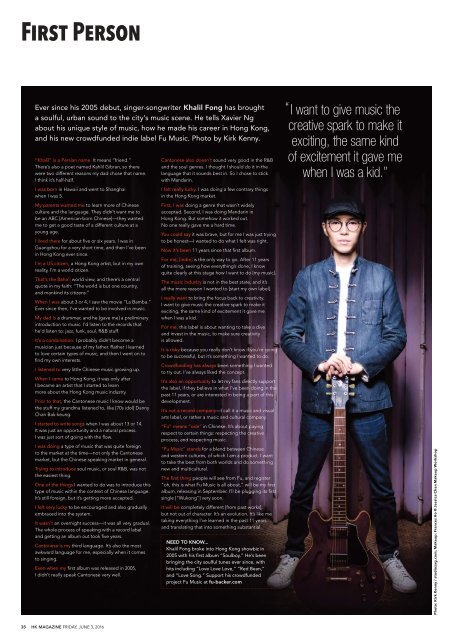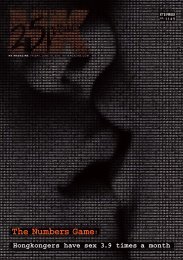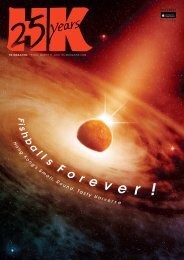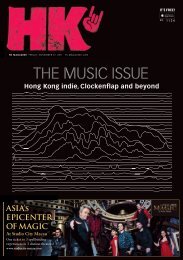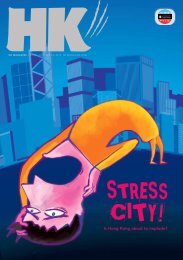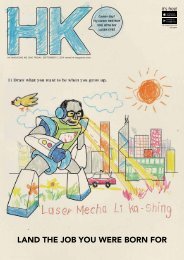Hong Kong’s rumors and secrets exposed
eWX4qhb
eWX4qhb
Create successful ePaper yourself
Turn your PDF publications into a flip-book with our unique Google optimized e-Paper software.
First Person<br />
Ever since his 2005 debut, singer-songwriter Khalil Fong has brought<br />
a soulful, urban sound to the city’s music scene. He tells Xavier Ng<br />
about his unique style of music, how he made his career in <strong>Hong</strong> Kong,<br />
<strong>and</strong> his new crowdfunded indie label Fu Music. Photo by Kirk Kenny.<br />
“Khalil” is a Persian name. It means “friend.”<br />
There’s also a poet named Kahlil Gibran, so there<br />
were two different reasons my dad chose that name.<br />
I think it’s half-half.<br />
I was born in Hawaii <strong>and</strong> went to Shanghai<br />
when I was 5.<br />
My parents wanted me to learn more of Chinese<br />
culture <strong>and</strong> the language. They didn’t want me to<br />
be an ABC [American-born Chinese]—they wanted<br />
me to get a good taste of a different culture at a<br />
young age.<br />
I lived there for about five or six years. I was in<br />
Guangzhou for a very short time, <strong>and</strong> then I’ve been<br />
in <strong>Hong</strong> Kong ever since.<br />
I’m a US citizen, a <strong>Hong</strong> Kong artist, but in my own<br />
reality, I’m a world citizen.<br />
That’s the Baha’i world view, <strong>and</strong> there’s a central<br />
quote in my faith: “The world is but one country,<br />
<strong>and</strong> mankind its citizens.”<br />
When I was about 3 or 4, I saw the movie “La Bamba.”<br />
Ever since then, I’ve wanted to be involved in music.<br />
My dad is a drummer, <strong>and</strong> he [gave me] a preliminary<br />
introduction to music. I’d listen to the records that<br />
he’d listen to: jazz, funk, soul, R&B stuff.<br />
It’s a combination: I probably didn’t become a<br />
musician just because of my father. Rather I learned<br />
to love certain types of music, <strong>and</strong> then I went on to<br />
find my own interests.<br />
I listened to very little Chinese music growing up.<br />
When I came to <strong>Hong</strong> Kong, it was only after<br />
I became an artist that I started to learn<br />
more about the <strong>Hong</strong> Kong music industry.<br />
Prior to that, the Cantonese music I know would be<br />
the stuff my gr<strong>and</strong>ma listened to, like [70s idol] Danny<br />
Chan Bak-keung.<br />
I started to write songs when I was about 13 or 14.<br />
It was just an opportunity <strong>and</strong> a natural process.<br />
I was just sort of going with the flow.<br />
I was doing a type of music that was quite foreign<br />
to the market at the time—not only the Cantonese<br />
market, but the Chinese-speaking market in general.<br />
Trying to introduce soul music, or soul R&B, was not<br />
the easiest thing.<br />
One of the things I wanted to do was to introduce this<br />
type of music within the context of Chinese language.<br />
It’s still foreign, but it’s getting more accepted.<br />
I felt very lucky to be encouraged <strong>and</strong> also gradually<br />
embraced into the system.<br />
It wasn’t an overnight success—it was all very gradual.<br />
The whole process of speaking with a record label<br />
<strong>and</strong> getting an album out took five years.<br />
Cantonese is my third language. It’s also the most<br />
awkward language for me, especially when it comes<br />
to singing.<br />
Even when my first album was released in 2005,<br />
I didn’t really speak Cantonese very well.<br />
Cantonese also doesn’t sound very good in the R&B<br />
<strong>and</strong> the soul genres. I thought I should do it in the<br />
language that it sounds best in. So I chose to stick<br />
with M<strong>and</strong>arin.<br />
I felt really lucky. I was doing a few contrary things<br />
in the <strong>Hong</strong> Kong market.<br />
First, I was doing a genre that wasn’t widely<br />
accepted. Second, I was doing M<strong>and</strong>arin in<br />
<strong>Hong</strong> Kong. But somehow it worked out.<br />
No one really gave me a hard time.<br />
You could say it was brave, but for me I was just trying<br />
to be honest—I wanted to do what I felt was right.<br />
Now it’s been 11 years since that first album.<br />
For me, [indie] is the only way to go. After 11 years<br />
of training, seeing how everything’s done, I know<br />
quite clearly at this stage how I want to do [my music].<br />
The music industry is not in the best state, <strong>and</strong> it’s<br />
all the more reason I wanted to [start my own label].<br />
I really want to bring the focus back to creativity.<br />
I want to give music the creative spark to make it<br />
exciting, the same kind of excitement it gave me<br />
when I was a kid.<br />
For me, this label is about wanting to take a dive<br />
<strong>and</strong> invest in the music, to make sure creativity<br />
is allowed.<br />
It is risky because you really don’t know if you’re going<br />
to be successful, but it’s something I wanted to do.<br />
Crowdfunding has always been something I wanted<br />
to try out. I’ve always liked the concept.<br />
It’s also an opportunity to let my fans directly support<br />
the label, if they believe in what I’ve been doing in the<br />
past 11 years, or are interested in being a part of this<br />
development.<br />
It’s not a record company—I call it a music <strong>and</strong> visual<br />
arts label, or rather a music <strong>and</strong> cultural company.<br />
“Fu” means “ode” in Chinese. It’s about paying<br />
respect to certain things: respecting the creative<br />
process, <strong>and</strong> respecting music.<br />
“Fu Music” st<strong>and</strong>s for a blend between Chinese<br />
<strong>and</strong> western cultures, of which I am a product. I want<br />
to take the best from both worlds <strong>and</strong> do something<br />
new <strong>and</strong> multicultural.<br />
The first thing people will see from Fu, <strong>and</strong> register<br />
“oh, this is what Fu Music is all about,” will be my first<br />
album, releasing in September. I’ll be plugging its first<br />
single [“Wukong”] very soon.<br />
It will be completely different [from past works],<br />
but not out of character. It’s an evolution. It’s like me<br />
taking everything I’ve learned in the past 11 years<br />
<strong>and</strong> translating that into something substantial.<br />
NEED TO KNOW...<br />
Khalil Fong broke into <strong>Hong</strong> Kong showbiz in<br />
2005 with his first album “Soulboy.” He’s been<br />
bringing the city soulful tunes ever since, with<br />
hits including “Love Love Love,” “Red Bean,”<br />
<strong>and</strong> “Love Song.” Support his crowdfunded<br />
project Fu Music at fu-backer.com<br />
“ I want to give music the<br />
creative spark to make it<br />
exciting, the same kind<br />
of excitement it gave me<br />
when I was a kid.”<br />
Photo: Kirk Kenny / studiozag.com; Makeup: Frances Ho @ Jessica Chan Makeup Workshop<br />
38 HK MAGAZINE FRIDAY, JUNE 3, 2016


